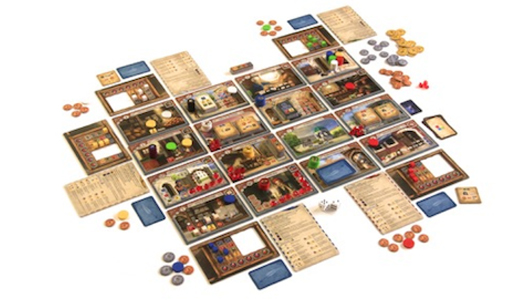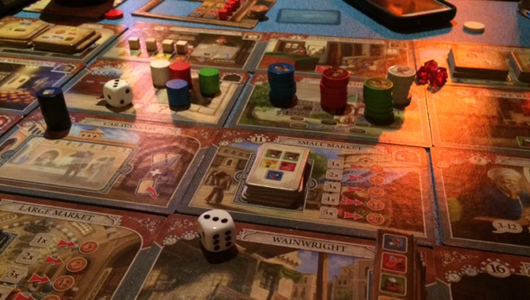After my first game of Lords of Waterdeep, I fell in love with worker placement games. For my gaming preferences, those types of games always hit the right balance between strategy, player competitiveness and resource management. Whether beautiful, simple and small like Carcassone, or complicated and layered like Russian Railroads, I always looked forward of sending my meeples off to their tasks and competing with other players for those special lucrative places on the board. Therefore I was looking forward to playing Istanbul, my excitement fuelled by it winning the 2014’s Kennerspiel des Jahres, an award for the best advanced strategy game of the year – this sounded like a stellar recommendation.
• Designer: Rudiger Dorn
• Publisher: Pegasus Spiele
• Number of Players: 2-5
• Playing Time: 40-60 min
In Istanbul, you play as a merchant who is sending his assistants around the Turkish bazaar to gather resources and money in order to obtain 5 rubies, or 6 rubies in the two player game. The bazaar is a 4 x 4 board of tiles, the position of which can be either dealt randomly or laid out in the orders advised in the rule book for quick or more advanced play-throughs. The bazaar tiles offer a variety of goods and money; adding a luck element with dice rolling betting mechanic and allows you to exchange these items for rubies, special powers or bonus cards.
Moving throughout the board is probably one of the most interesting parts of Istanbul. The merchant cannot perform any tasks without his assistants, so he needs to take at least one of his assistants with him wherever he goes. All of them are represented by a stack of tokens, merchant token being a slightly more chunky and denoted with a merchant sticker. Each turn the player can move their stack one or two tiles horizontally or vertically, leaving one assistant behind on each tile where they perform a task. In order to pick up the assistants, the player will have to either return to the Fountain tile or to retrace some of their steps by revising the tiles where they have left assistants. The moving mechanic together with alternative tiles layouts, which could either make useful places more or less accessible, make the route planning key for the game. Indeed, some rush considerations would result in players unnecessary retracing their steps or spending their turn to go to the Fountain to collect all of the assistants.
However, this is not as limiting as it might initially sound. In fact, the number of assistants is the only limitation that the game puts on the movement around the board. If the player happens to meet another merchant on the same tile, the only penalty is to pay that merchant’s owner two lira, which is not a big sum in the game. Even with other merchants occupying the tile, the player can still use its effects. Paying two lira, especially at the beginning of the game, might not be the ideal, however this is not enough to encourage players to avoid each other and use unoccupied tiles instead. Therefore the tiles are really accessible, as long as you have enough assistants to reach them.
Although that allows a plethora of choices, which should be a positive point for the game, I can see some problems with this approach that are not usually present in worker placement games. For example, in Lords of Waterdeep if the meeple occupied a spot on the board, no other players could use that space, unless they had a special power, which is rare. This encouraged other players to be very mindful of things happening on the board and of what other players were doing. Missing a chance to occupy a certain place was a significant downside, which could impact on the chances of winning the game. Therefore Istanbul feels a lot more relaxed than what I usually expect from worker placement games.
I do not feel like I need to rush to a certain tile before someone else gets there. In fact, it is incredibly hard to do anything that can impede the other player’s movements. I found that I needed to pay very little attention to what other players were doing on the board as their movements had very little effect to where I planned to go next. It also made good tiles on the board less special because, technically, I could get to them any time I needed them.
The lack of player interaction was possibly my biggest disappointment in the game, especially considering how much potential the ‘merchants in a Turkish bazaar’ theme has. The merchants could have been sending their assistants to mess up or out bargain other assistants for goods. They could have been making secret pacts in the Black Market or making alliances in the Fountain square. The family member mechanic in the game gives a little nod to this concept, but it still feels lacking. By no means do I wish that all of the above was included in the game. However, it would be nice to have more contact with other players and be more invested in the actions performed by other players on the board. It would certainly keep players’ attention on the board while they are waiting for their turn.
Despite the aforementioned concerns, I still enjoyed the game a great deal. In general, there are two main strategies to acquiring rubies: the money route or the goods route, both of which could be bolstered by collecting bonus cards or completing the wheelbarrow. Initially, it seemed to me that the money route would be slightly overpowered. Both Market tiles give very lucrative goods to lira exchange rate and there are many other places to get coin as well. However, it balances quite nicely, as the goods route allows to get more bonus powers. While the money route is initially a faster way to get rubies, the goods route catches up pretty quickly. Of course, the mixture of both is also a completely sound strategy.
Through my research of the game prior to this review, I have come up across several articles questioning whether Istanbul should have been competing in the Kennerspiel des Jahres. Perhaps, it would have been more suitable in the Spiel des Jahres category (won by Camel Up! in 2014) as it is not advanced or difficult enough. Personally, I do not agree with this view at all, especially the game being ‘difficult’ as the prerequisite. 7 Wonders was the winner of one of the previous Kennerspiel des Jahres, and the only difficult part of that game was the scoring, as there were too many things to take into account! Also the game definitely does not have to be difficult to be designed for advanced board gamers.
Istanbul is very easy to understand. Once the player gets accustomed to different tiles and their powers, there is nothing complicated or confusing about the game. However, this does not mean that the gameplay is simplistic. In one of my play-throughs, my friend won the game by performing an excellent combo which consisted of having the right amount of resources, combination of bonus cards and being on the right tile to do all those actions. The game can be played through simply yielding benefits from tiles and will still be fun. However, the advanced players will see how to create combinations and chain reactions that will lead them to the victory faster. So I would really like to praise Istanbul for being easily accessible and still having opportunities for other players to challenge themselves.
Finally, a few words on the physical quality of the game – it is definitely obvious that Istanbul is a “Eurogame”. It has many little pieces and its art is on par as well. However, the nice part about little tokens is that they are different enough to make sorting and arranging them easy and relatively fast. Having little plastic rubies is also an advantage. The bilingual aspect of the game was also a pleasant surprise. While I do not speak German, it is nice to see a game so nicely integrate two languages in one game set. My only other gripe (it is the same with many games, particularly Eurogames) that it would be nice to see a player being referred not only as ‘him’ or ‘his’.
I have found it very hard to decide on the score for Istanbul as I kept constantly switching between 3 and 4 barrels. While there are some aspects of the game I really like to praise it for – for example, the movement mechanic – there are a few missed opportunities that have make the game less exciting for me. Istanbul is good fun game. It is easy to pick up, relatively fast to play and a worthy winner of Kennerspiel des Jahres. However, worker placement games, like Lords of Waterdeep, have raised my expectations pretty high and Istanbul will have tough competition on my board game shelf.
Tags: Kennerspiel des Jahres, meeples, Pegasus Spiel, rubies, Rudiger Dorn, Spiel des Jahres, Turkish Bazaar, Worker placement






